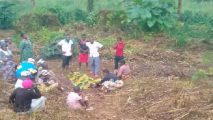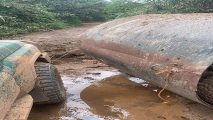Categories
Recent Posts
- Football: Panthère du Ndé Wins Cameroon Cup 2025
- Fifa brings in new £45 ticket for 2026 World Cup
- President Sisiku Ayuk Tabe, top aides to appear before the Supreme Court
- Pressure mounts on Biya as speculation grows over possible replacement of Ngute
- 2025 is the year when Biya’s long rule finally lost its last convincing justification
Archives
- December 2025
- November 2025
- October 2025
- September 2025
- August 2025
- July 2025
- June 2025
- May 2025
- April 2025
- March 2025
- February 2025
- January 2025
- December 2024
- November 2024
- October 2024
- September 2024
- August 2024
- July 2024
- June 2024
- May 2024
- April 2024
- March 2024
- February 2024
- January 2024
- December 2023
- November 2023
- October 2023
- September 2023
- August 2023
- July 2023
- June 2023
- May 2023
- April 2023
- March 2023
- February 2023
- January 2023
- December 2022
- November 2022
- October 2022
- September 2022
- August 2022
- July 2022
- June 2022
- May 2022
- April 2022
- March 2022
- February 2022
- January 2022
- December 2021
- November 2021
- October 2021
- September 2021
- August 2021
- July 2021
- June 2021
- May 2021
- April 2021
- March 2021
- February 2021
- January 2021
- December 2020
- November 2020
- October 2020
- September 2020
- August 2020
- July 2020
- June 2020
- May 2020
- April 2020
- March 2020
- February 2020
- January 2020
- December 2019
- November 2019
- October 2019
- September 2019
- August 2019
- July 2019
- June 2019
- May 2019
- April 2019
- March 2019
- February 2019
- January 2019
- December 2018
- November 2018
- October 2018
- September 2018
- August 2018
- July 2018
- June 2018
- May 2018
- April 2018
- March 2018
- February 2018
- January 2018
- December 2017
- November 2017
- October 2017
- September 2017
- August 2017
- July 2017
- June 2017
- May 2017
- April 2017
- March 2017
- February 2017
- January 2017
- December 2016
- November 2016
- October 2016
- September 2016
- August 2016
- July 2016
- June 2016
Featured
 2025 is the year when Biya’s long rule finally lost its last convincing justification
2025 is the year when Biya’s long rule finally lost its last convincing justification  Young Cameroonians: Build social capital to succeed
Young Cameroonians: Build social capital to succeed  Eulogy for HRH Nfor Professor Teddy Ako of Ossing
Eulogy for HRH Nfor Professor Teddy Ako of Ossing  Will Fr. Paul Verdzekov recognize the refurbished and rededicated Cathedral in Bamenda were he to return today?
Will Fr. Paul Verdzekov recognize the refurbished and rededicated Cathedral in Bamenda were he to return today?  Cameroon apparently under a de facto federalism
Cameroon apparently under a de facto federalism
Most Commented Posts
 4 Anglophone detainees killed in Yaounde
4 Anglophone detainees killed in Yaounde
18 comments Chantal Biya says she will return to Cameroon if General Ivo Yenwo, Martin Belinga Eboutou and Ferdinand Ngoh Ngoh are sacked
Chantal Biya says she will return to Cameroon if General Ivo Yenwo, Martin Belinga Eboutou and Ferdinand Ngoh Ngoh are sacked
13 comments The Anglophone Problem – When Facts don’t Lie
The Anglophone Problem – When Facts don’t Lie
12 comments Anglophone Nationalism: Barrister Eyambe says “hidden plans are at work”
Anglophone Nationalism: Barrister Eyambe says “hidden plans are at work”
12 comments Largest wave of arrest by BIR in Bamenda
Largest wave of arrest by BIR in Bamenda
10 comments
Latest Tweets
Featured
-

Football: Panthère du Ndé Wins Cameroon Cup 2025
-

Fifa brings in new £45 ticket for 2026 World Cup
-

President Sisiku Ayuk Tabe, top aides to appear before the Supreme Court
-

Pressure mounts on Biya as speculation grows over possible replacement of Ngute
-

2025 is the year when Biya’s long rule finally lost its last convincing justification
-

Armed Mbororo tribesmen killed 8 in Southern Cameroons’ new war
-

Southern Cameroons Crisis: Atanga Nji Boys abduct 8 people en route to Kumbo
© Cameroon Concord News 2025
14, December 2017
Yaounde closes border with Nigeria in the North 0
Cameroon has closed its border with Nigeria in the north, after a series of attacks by Boko Haram militants on Cameroonian ranchers. The closure is meant to protect the ranchers’ cattle, but it is hurting the ranchers’ business.
Hundreds of ranchers have brought their cattle and livestock to the Bogo market on Cameroon’s northern border with Nigeria. According to Cameroon’s government, this market is the supply point for most of the cattle sold across the border.
But cattle rancher and seller Ahminou Ngomna says he has not seen his Nigerian customers since September. Business usually booms with the approach of the Christmas and New Year feasts, but that is not the case now.
Only customers from Maroua in northern Cameroon have been buying from the market, and the amount they pay per cattle is not up to what Nigerian buyers pay, Ngomna said. The price per cow, which ranges from $500 to $1,000 depending on size and weight, has fallen to as little as $250.
FILE – A member of a civilian vigilante group carries a bow and arrow while running on patrol with the Cameroonian military in Kerawa, Cameroon, March 16, 2016. Kerawa is on the border with Nigeria and is subject to frequent Boko Haram attacks.
Hamidou Bouba, first deputy mayor of Bogo, says the prices started dropping when Cameroon’s government ordered the closure of parts of the border with Nigeria. The move was made because Boko Haram attacks on farmers and cattle ranchers, which had fallen since January, increased in September with armed men crossing the border for supplies.
“We are suffering very badly about this situation of Boko Haram,” Bouba said. “That is the reason why all the traders cannot go to Nigeria now. We changed their direction, moving their activities to Douala or Yaounde. That is the only solution. I think that we don’t have another solution.”
Bouba says the ranchers are encouraged to transport their cattle some 70 kilometers from the affected zones to the nearest market, because even buyers from the hinterlands of Cameroon are refusing to travel to Bogo.
Cattle ranchers and farmers comprise 80 percent of the population of the border areas. Cameroon reports that more than 100,000 have relocated due to the Boko Haram insurgency; others live in abject poverty.
Louis Paul Motaze, Cameroon’s economy minister, says the government will build new markets in safer areas.
“People here are suffering a lot not only because of the war with Boko Haram, but because of poverty,” Motaze. “This is why we would like to take into consideration another battle, and this battle is the battle for development.”
The Boko Haram insurgency, which began in northeast Nigeria eight years ago, has left at least 25,000 people dead and forced more than 2.6 million others to flee their homes, according to the United Nations.
Source: VOA